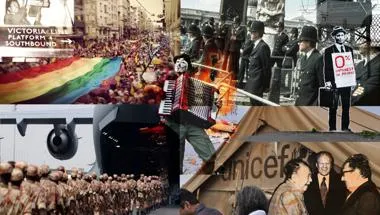
Marianna Patat
PhD candidate in the Department of War Studies
Contact details
Biography
Marianna is a LISS-DTP funded PhD candidate in the Department of War Studies. Her research looks at global histories and geographies of mobility control, with a particular focus on the politics of death and abandonment in contemporary sea-crossings and border deaths at sea in the Mediterranean.
Marianna works as a Graduate Teaching Assistant on the undergraduate module ‘International Relations Theory’ and is currently assisting on the project ‘The Racism - Migration - Slavery Triangle’ as part of an interdisciplinary team of researchers at King’s and external partners. Marianna is also involved in the collaborative project Run, Walk, Welcome, which aims to challenge hostile narratives on forced migration. She is a member of BISA and EISA.
Marianna holds a BA in Political and Social Sciences from Sciences Po Paris (Nancy campus). During her third year, she read Italian, German, and Spanish at the Modern and Medieval Languages Department at the University of Cambridge. Marianna then completed an MSc in International Relations (Research) at LSE and an MA in International Conflict Studies at King’s.
Marianna worked as a migration politics researcher for an Italo-German think-tank based in Italy. She has extensive editorial experience as an editorial board member for Millennium: Journal of International Studies at LSE and senior editor for a legal research platform in the fields of data protection, cybersecurity, whistleblowing, and AI.
Research Interests
-
Forced migration, bordering, and histories and geographies of mobility control in the Mediterranean
-
Death, necropolitics, and theories of the human
-
Arts-based methodologies
Thesis title
La Strage di Cutro: Narrating From and With the Wake
Abstract
This project situates the 2023 Strage di Cutro, the drowning of 94 forced migrants in their attempt to cross the Mediterranean Sea, off the coast of Calabria, Southern Italy, within global racial-colonial histories and geographies of mobility control. With a view to complicating linear, Euro- and terra-centric narrative arcs that frame and flatten border death as a ‘tragedy’, the project asks how mobility control and modulations on the politics of death (Mbembe, 2019) – by action or inaction – converge and continuously co-constitute death in and through configurations of difference. To do so, I develop the concept of necrogeography to hold in tension practices, structures, and relations that sustain, resist, and otherwise entangle with death, abandonment, and neglect, with acts of solidarity, connectivity, and collective care in the context of the EUropean border regime.
Grounded in my conversations with a network of affected forced migrants, local activists, and NGOs who generously shared their experiences, alongside my ethnographic practice in Crotone for the second anniversary of the Strage, I narrate from and with the wake, and yet only partially and fragmentarily, asking how we can mourn, cultivate collective memory, and exist amidst unfolding and ongoing violence and struggle. As an act of avowal in the face of erasure, I centre what Sharpe calls ‘wake work’ (2016), a tool of reimagination, mourning, and creativity to ‘produce in, into, and through the wake an insistence on existing’ (p. 11). The story(e)scape as a concept, method, and ethic guides the approach, structure, and writing of this project.
Supervisors
- Dr Stephan Engelkamp
- Dr Leonie Ansems de Vries
Research Centres & Groups
Projects
Connecting Education for Sustainability and Cultural Competency at King’s
Research

Connecting Education for Sustainability and Cultural Competency at King’s
Employing Education for Sustainability and Cultural Competency to tackle the climate crisis, and forms of intercultural hostility and identitarian conflict.
Project status: Ongoing

Arts & Conflict Hub
The Arts & Conflicts hub uses artistic mediums to communicate, teach and research the complexities of conflict

Research Centre in International Relations (RCIR)
The Research Centre in International Relations conducts research on practices of security and conflict, their transformation, and their social and political implications.
Research

Connecting Education for Sustainability and Cultural Competency at King’s
Employing Education for Sustainability and Cultural Competency to tackle the climate crisis, and forms of intercultural hostility and identitarian conflict.
Project status: Ongoing

Arts & Conflict Hub
The Arts & Conflicts hub uses artistic mediums to communicate, teach and research the complexities of conflict

Research Centre in International Relations (RCIR)
The Research Centre in International Relations conducts research on practices of security and conflict, their transformation, and their social and political implications.
